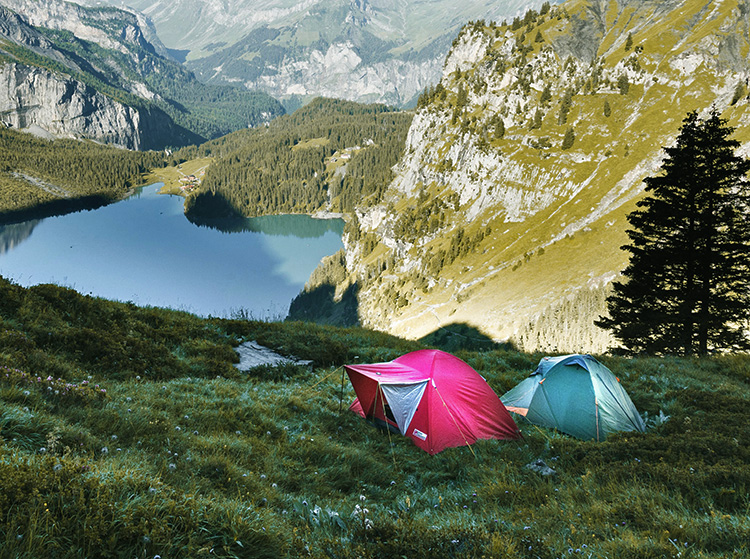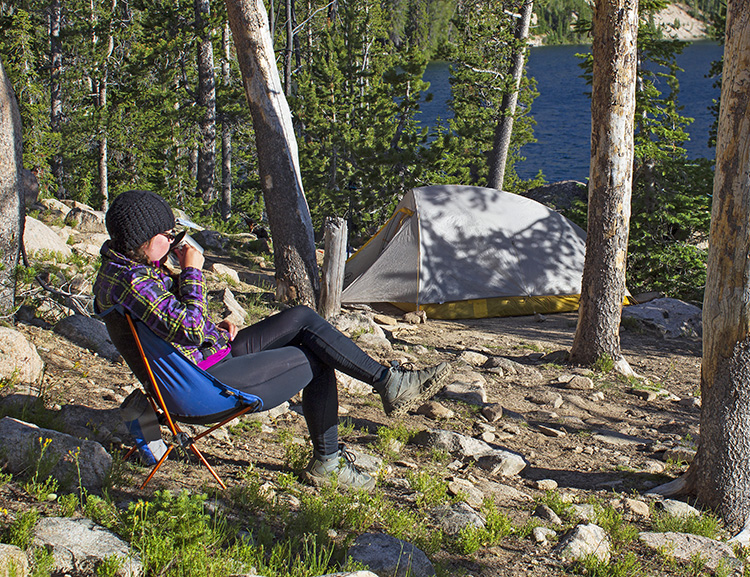Camping Safety: Essential Tips for a Secure Outdoor Experience
back to the: Camping Guide
There's something incredibly refreshing about escaping the hustle and bustle of daily life and delving into the serenity of the great outdoors. Camping offers an opportunity to disconnect, enjoy nature's wonders, and rejuvenate one's mind and body. However, the wilderness, as captivating as it is, comes with its set of challenges. Here are some essential tips to ensure your camping trip is not only memorable but also safe.
 choose the right campsite
choose the right campsite1. Do Your Homework
Before setting out, familiarize yourself with the camping location. Research the area, check the weather forecast, and be aware of any alerts or restrictions. It's always wise to inform someone who isn't going with you about your plans and expected return time.
2. Get the Safely
In addition to researching the camping location, it's essential to plan your transportation to the site carefully. Make sure your vehicle is equipped for the journey, especially if you're venturing off-road. Consider adding a truck cap to store your gear safely and protect it from the elements—WildTop offers a variety of truck caps that are perfect for such adventures. Ensuring your transportation is in top condition will help make your trip smoother and stress-free.
3. Choose the Right Campsite
Select a location that's elevated and at a distance from water bodies. This will reduce the chances of flooding and unexpected encounters with wildlife coming for a drink. Keep an eye out for signs of animal activity and avoid setting up camp near animal trails or burrows.
4. Safe Campfire Practices
Always check for campfire restrictions in your chosen area. Ensure your campfire is a safe distance from tents, trees, and other flammable items. Always put out the fire completely before retiring for the night or leaving the campsite.
5. Store Food Properly
The smell of food can attract wildlife. Store food in airtight containers and hang them from a tree or use a bear-proof container if you're in bear country. Clean up immediately after meals and dispose of waste properly.
6. Equip Yourself for the Climate
Weather can be unpredictable. Dress in layers, ensuring you have both lightweight and warm clothing options. For those camping in colder climates, having the right gear is paramount. Consider packing items like a battery operated warming blanket, which can be a lifesaver when temperatures plummet. Companies like ZonliHome offer innovative solutions, ensuring that even in the wild, you can keep warm without a continuous power source.
7. Wildlife Encounters
Always view wildlife from a distance and never feed them. Feeding wild animals not only endangers you but can also harm the animal and alter natural behaviors. If you encounter a wild animal, speak calmly and firmly and avoid sudden movements. Always ensure you're informed about the specific wildlife in the area you're visiting.
8. Emergency Preparedness
Accidents can happen. Carry a well-stocked first aid kit and familiarize yourself with basic first aid practices. Additionally, equip yourself with a whistle, a map, a compass, and a flashlight with extra batteries. Consider enrolling in a basic wilderness survival course if you frequently camp in remote areas.
 Stay Hydrated and Protected
Stay Hydrated and Protected 9. Stay Hydrated and Protected
Consume ample water to stay hydrated, especially if you're indulging in strenuous activities. Protect yourself from the sun with hats, sunglasses, and sunscreen. Ensure you have insect repellent to keep bugs at bay.
10. Leave No Trace
Respect nature and follow the principle of "leave no trace." This means packing out all your trash, leaving what you find, and minimizing campfire impacts. Your goal should be to leave the campsite as you found it, if not better.
11. Use Technology Wisely
In our digital age, there are various devices and apps designed to enhance safety while camping. Consider using GPS devices or apps to help navigate unfamiliar terrains. Also, there are mobile applications that can help identify plants, which can be invaluable if you're unsure about a particular plant's edibility or potential toxicity. Still, always remember that technology can fail or batteries can die, so always have traditional backup tools like maps and compasses.
12. Be Cautious of Water Sources
While a stream or lake might seem like a pristine source of drinking water, it could contain harmful pathogens. Always boil, filter, or treat water before consuming it. If you're unsure about the safety of a water source, it's better to err on the side of caution.
13. Campsite Security
While most fellow campers are friendly and respectful, it's still important to secure your belongings. Use lockable storage containers or your vehicle to store valuables. At night, keep essential items like your flashlight, shoes, and whistle within arm's reach.
14. Proper Tent Setup
Ensure your tent is appropriately pegged down to withstand winds. Also, make sure there's adequate ventilation to prevent condensation build-up inside. On colder nights, a battery-operated warming blanket from ZonliHome can provide an extra layer of warmth, ensuring a comfortable night's sleep even in more frigid climates.
15. Avoid Camping Alone
There's safety in numbers. If possible, avoid camping alone, especially in remote areas. If you do prefer solitary camping, always ensure someone knows your plans, whereabouts, and expected return date.
16. Familiarize Yourself with Local Regulations
Different parks and camping areas might have specific regulations, including permitted camping zones, fire restrictions, or guidelines about interacting with wildlife. Adhering to these rules will not only ensure your safety but also help preserve the environment for future visitors.
17. Be Prepared for Emergencies
Beyond a basic first aid kit, consider carrying emergency blankets, a multi-tool or knife, and even a signaling mirror. Knowing basic emergency signals and having a plan in case of unforeseen events can make a significant difference.
In Summary
Safety in camping is a blend of preparation, awareness, and respect for nature. While the great outdoors offers an escape and a profound connection with our planet, it's essential to remember that nature can be unpredictable. By equipping yourself with the right knowledge, tools, and mindset, you can ensure that your camping trips are memorable for all the right reasons. As you pack for your next adventure, consider incorporating innovations like the battery-operated warming blanket from ZonliHome to enhance your camping comfort and safety. Safe travels!
Related Information
- Camping Tips & Hacks For Safe Backcountry Camping
- Hiking Guide — everything you need to know about hiking
- Outdoor Baby Camping Beds
- Camping Guide
Do you have feedback, a comment or correction? Let us know
